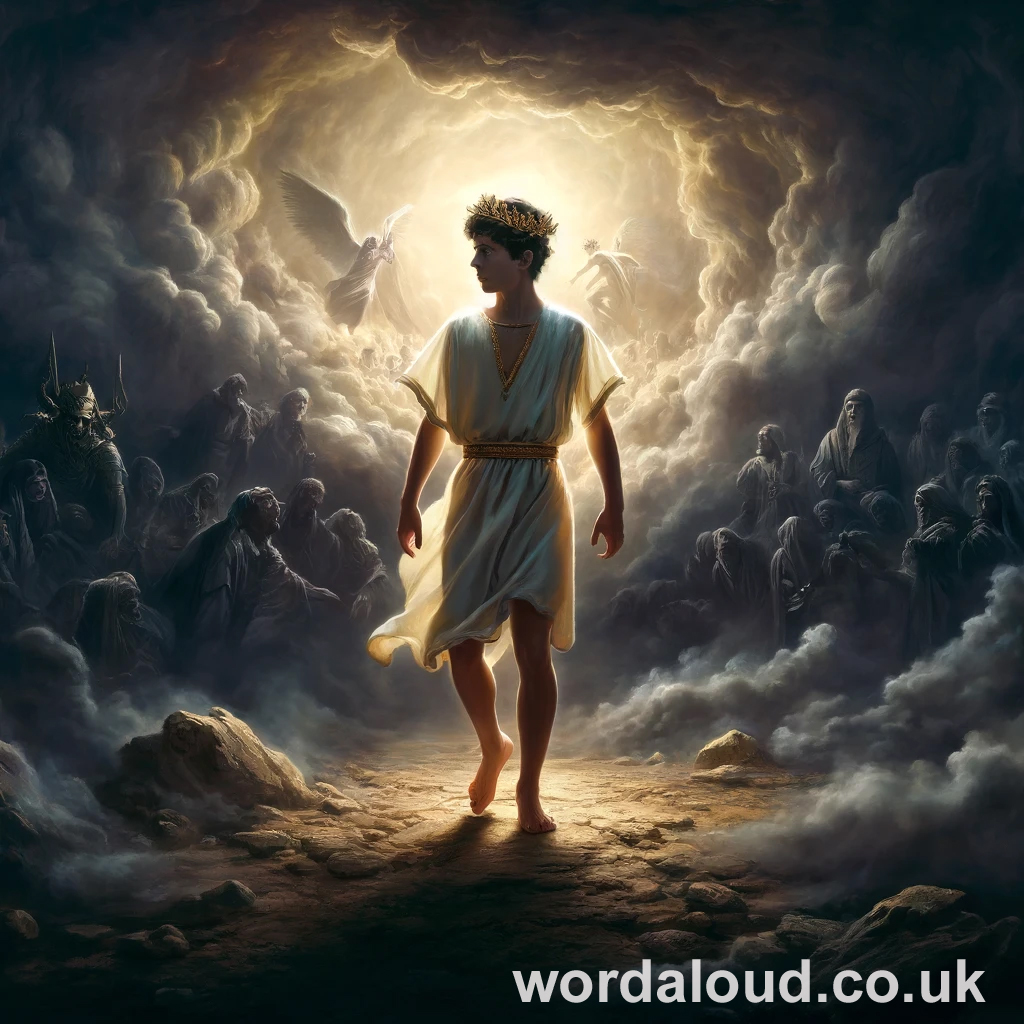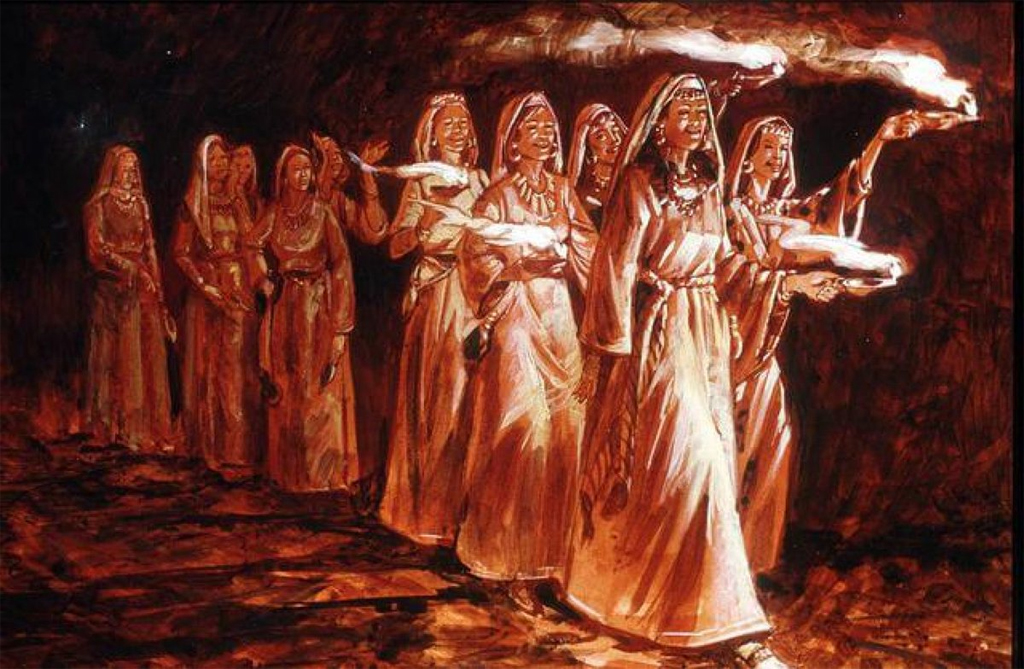Christian Art | Prayer With Jesus | Psalms | Trust In God Under Persecution | King David As A Boy | Audio KJV | King James Version | Image By Dall-E
Psalm 56 | King James Audio Bible
YouTube: Psalm 56 | KJV | King James Version | Audio Bible | Word Aloud
Psalm 56 is a heartfelt prayer and an expression of profound trust in God amid distress and persecution. The psalmist begins by pleading for God’s mercy, feeling besieged by adversaries who seek to oppress and swallow him up. This prayer encapsulates the psalmist’s raw emotions and the desire for divine intervention in the face of adversity.
The psalmist confronts the reality of daily strife and relentless enemies who gather against him. In these challenging times, fear and uncertainty grip his heart, yet he declares his unwavering trust in God. His faith in God is not shaken; instead, it becomes a source of strength and praise.
Amid the turmoil, the psalmist acknowledges that enemies twist his words and harbour malicious intentions. He is the target of constant surveillance and threats. It is a scenario of treachery and deception where enemies plot against his life.
The psalmist calls upon divine justice, beseeching God to cast down the people who engage in such wickedness. This prayer reflects the psalmist’s plea for God to see his distress and come to his aid.
The psalmist finds solace in the thought that God not only hears his words but also collects his tears, storing them in His bottle and recording them in His book. This symbolism highlights God’s intimate knowledge of the psalmist’s pain and suffering.
Despite his fear and the relentless persecution, the psalmist has unwavering confidence that, when he cries out to God, his enemies will be turned back. His trust in God as a source of refuge and strength is the bedrock of his faith.
Throughout the psalm, the theme of trust in the face of adversity remains central. The psalmist seeks shelter in the Lord and praises His word, demonstrating an unshakeable belief in divine protection and deliverance.

Psalm 56 | King James Audio Bible KJV | Love Revealed By Jesus Christ
Be merciful unto me, O God, for man would swallow me up; he fighting daily oppresseth me.
Mine enemies would daily swallow me up, for they be many that fight against me, O thou Most High.
What time I am afraid, I will trust in thee.
In God I will praise his word, in God I have put my trust; I will not fear what flesh can do unto me.
Every day they wrest my words; all their thoughts are against me for evil.
They gather themselves together, they hide themselves, they mark my steps, when they wait for my soul.
Shall they escape by iniquity? in thine anger cast down the people, O God.
Thou tellest my wanderings, put thou my tears into thy bottle; are they not in thy book?
When I cry unto thee, then shall mine enemies turn back; this I know, for God is for me.
In God will I praise his word; in the Lord will I praise his word.
In God have I put my trust; I will not be afraid what man can do unto me.
Thy vows are upon me, O God; I will render praises unto thee.
For thou hast delivered my soul from death; wilt not thou deliver my feet from falling, that I may walk before God in the light of the living?

Key Themes Of The Psalm For Reflection | Love Revealed By Jesus Christ
- A Cry for God’s Mercy Amid Persecution: At the core of Psalm 56 lies a heartfelt plea for God’s mercy. The psalmist feels surrounded and oppressed by adversaries who seek to harm him. This theme of seeking divine compassion is a universal human experience, as people turn to God in times of distress and persecution.
- Unwavering Trust in God: Despite the fear and turmoil brought on by relentless enemies, the psalmist displays unwavering trust in God. This theme underscores the power of faith in God as a source of strength, even in the face of overwhelming adversity. The psalm is a testament to resilience of the human spirit when anchored in divine belief.
- Treachery and Malicious Intent: The psalmist openly acknowledges treachery and malicious intent of his enemies. This theme reflects harsh realities of life, where individuals face deception, surveillance, and threats from those who wish them harm. The psalmist’s honesty in acknowledging this struggle adds depth to the psalm’s emotional landscape.
- God’s Intimate Knowledge: The psalmist finds comfort in the belief that God not only hears his words but also intimately knows his suffering. The imagery of God collecting tears in a bottle and recording them in a book serves as a poignant symbol of divine empathy and awareness. This theme highlights the idea that God is intimately connected to the human experience.
- A Call for Divine Justice: The psalmist calls upon divine justice, asking God to cast down the wicked and intervene in his distress. This theme reflects the human desire for fairness and righteousness, as individuals often seek divine intervention to right the wrongs and injustices they face.
- Confidence in Divine Intervention: Despite challenging circumstances, the psalmist maintains confidence that crying out to God will lead to the reversal of fortunes. This theme underscores belief that God can turn back enemies and provide refuge and strength to those who trust in Him.
- Praising God’s Word and Seeking Shelter: Throughout the psalm, the psalmist praises God’s word and seeks shelter in the Lord. This reflects a deep connection to faith and a reliance on divine guidance and protection. It is a theme that resonates with many individuals who find solace in faith during difficult times.








